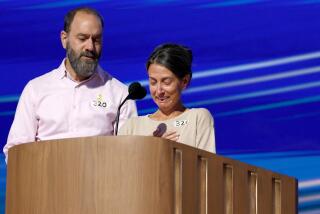Bush and Wiesenthal Center Pay Tribute to Actor Schwarzenegger
Hollywood moguls turned out en masse Sunday night as actor Arnold Schwarzenegger was honored by the Simon Wiesenthal Center at a glittering gala dinner that featured an appearance by his friend, President Bush.
The 43-year-old superstar, a major contributor to the Los Angeles-based organization, received its 1991 National Leadership Award and was lauded by the President as someone who âembodies the good, essential values of this world. . . . â
Also honored by the center for his role in the recent mass airlift of Ethiopian Jews to Israel, the President was presented with the Cup of Elijah. Rabbi Marvin Hier, dean of the Wiesenthal Center, said the cup symbolizes âthe great hope that all who find themselves enslaved shall one day be free.â
The President drew applause from the 1,300 guests when he said, âThe Holocaust must never be dehumanized or dismissed. We pledge it will also never be forgotten.â
Bush added: âWeâre here tonight in honor of a place that drives us to use the pain of our past literally to forge a better future. The Simon Wiesenthal Center is not just a museum, although its vivid images will never let the past fade, Itâs also an activist organization. . . . â
Proceeds from the $750-a-plate event at the Century Plaza will benefit the centerâs $50-million Museum of Tolerance, scheduled to open next Spring in a domed glass-and-granite building adjacent to its headquarters on Pico Boulevard.
Board chairman Samuel Belzberg said the museum is $6 million short of its fundraising goal.
As is customary at Wiesenthal events, the dinner mixed solemn references to the Holocaust and slides of Nazi concentration camp victims with Las Vegas-style entertainment.
In one dramatic moment, a group of Holocaust survivors marched into the ballroom carrying an American flag secretly pieced together from cloth scraps by inmates of the Mauthausen death camp and presented to their American liberators on May 5, 1945.
The Museum of Tolerance, being developed by James Gardner, a prominent British museum designer, will draw on the latest in electronic museum gadgetry to fulfill two objectives, according to museum director Gerald Margolis: âTo promote and develop an understanding of the relationship between tolerance and democracyâ and to present the history of the Holocaust in a way that will grab a young multiethnic audience.
Sundayâs dinner wound up a four-day visit by the President to the West Coast.
Earlier in the day, 40,000 Cambodians, Vietnamese, Laotians, Chinese, Ethiopians, Iraqis and Sikhs converged on Mile Square Regional Park in Fountain Valley to urge Bush to bring peace, freedom and democracy to their strife-torn homelands.
âCambodia is not free yet,â said Sandy A. Blankenship, a Cambodian-American from Cypress. âWe ask the President to continue to support a free Cambodia. . . . We want peace.â
Several dozen Ethiopians came to the Orange County park calling for peace between the factions at war in their native land.
âWe want Bush to call a meeting outside our country and to invite all the armed forces to set up a transitional government,â said Wondem WoldeEmanual, 45, a bank president from Covina.
Bush began his short speech with praise for hard-working and patriotic Asian and Pacific Americans. During the speech, a cluster of Iraqi-American women raised placards proclaiming: âWe Mourn 150,000+ killed Iraqis.â They want Bush to lift economic sanctions against Iraq.
âIt is the children who are suffering, not Saddam,â said Ilham Alsarraf, a Burbank psychologist and member of the American Iraqis for Democracy and Justice.
But Bush was not moved. In forceful remarks, he made clear his support of continued sanctions against Saddam Husseinâs regime. Alsarraf and her companions booed and chanted âmourn Iraq.â However their response was drowned out by cheers from audience members, some of whom said Bushâs commitment to Operation Desert Storm was the reason they will support his reelection in 1992.
The issue for Chris Wu, 55, an electrical engineer from Monterey Park, and his Chinese-American friends, was the 1989 massacre at Beijingâs Tien An Men Square and the student protesters who remain jailed for espousing democracy.
Wu waved a banner that read: âWe Love Bush and Human Rights.â But the Shanghai native added that the President must not renew Chinaâs most-favored-nation trade status without demanding human rights reforms in China.
When Wu heard Bush say human rights conditions must not be attached to trade agreements with China, he grimaced.
âDoesnât he see that he has the power to change the Chinese government?â Wu asked.
Times staff writers Kristina Lindgren and Lynn Smith in Orange County contributed to this story.
More to Read
The biggest entertainment stories
Get our big stories about Hollywood, film, television, music, arts, culture and more right in your inbox as soon as they publish.
You may occasionally receive promotional content from the Los Angeles Times.










